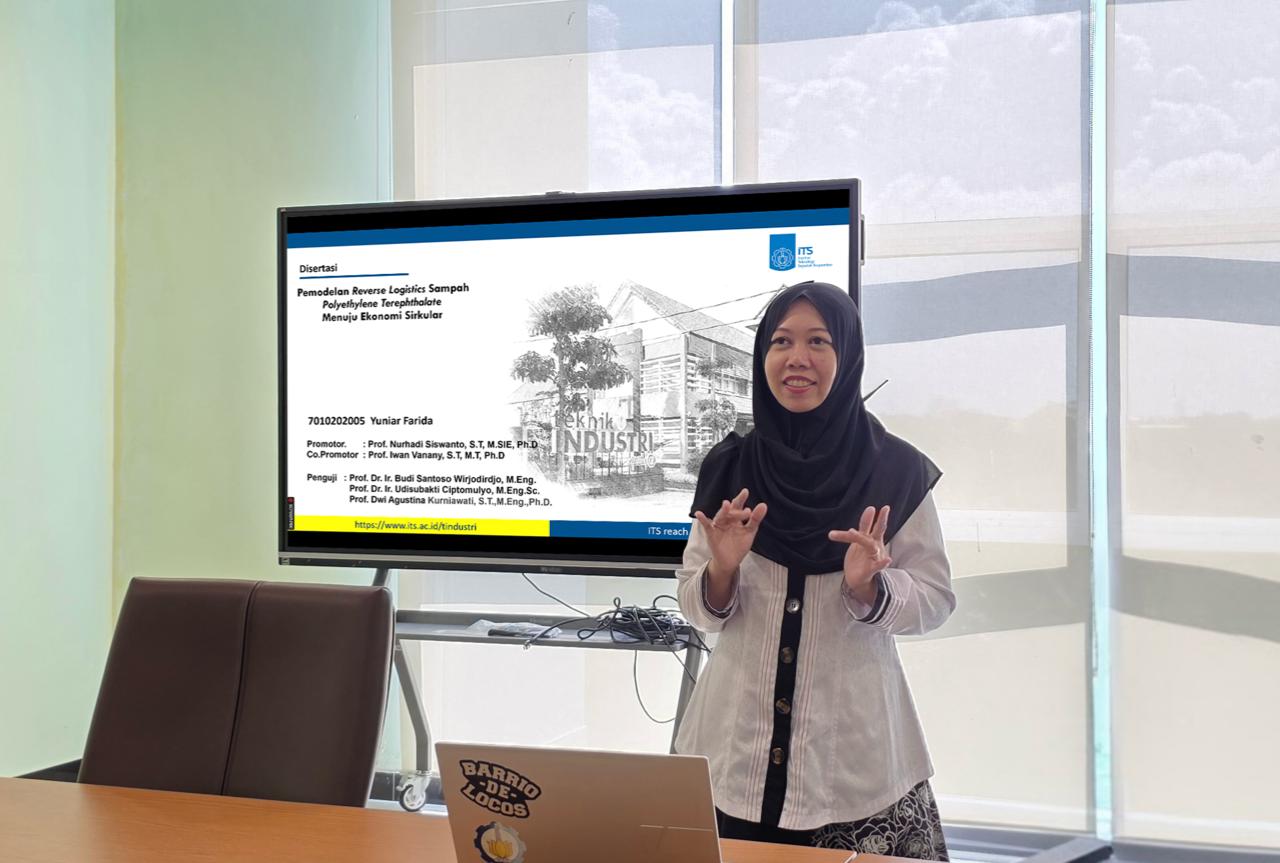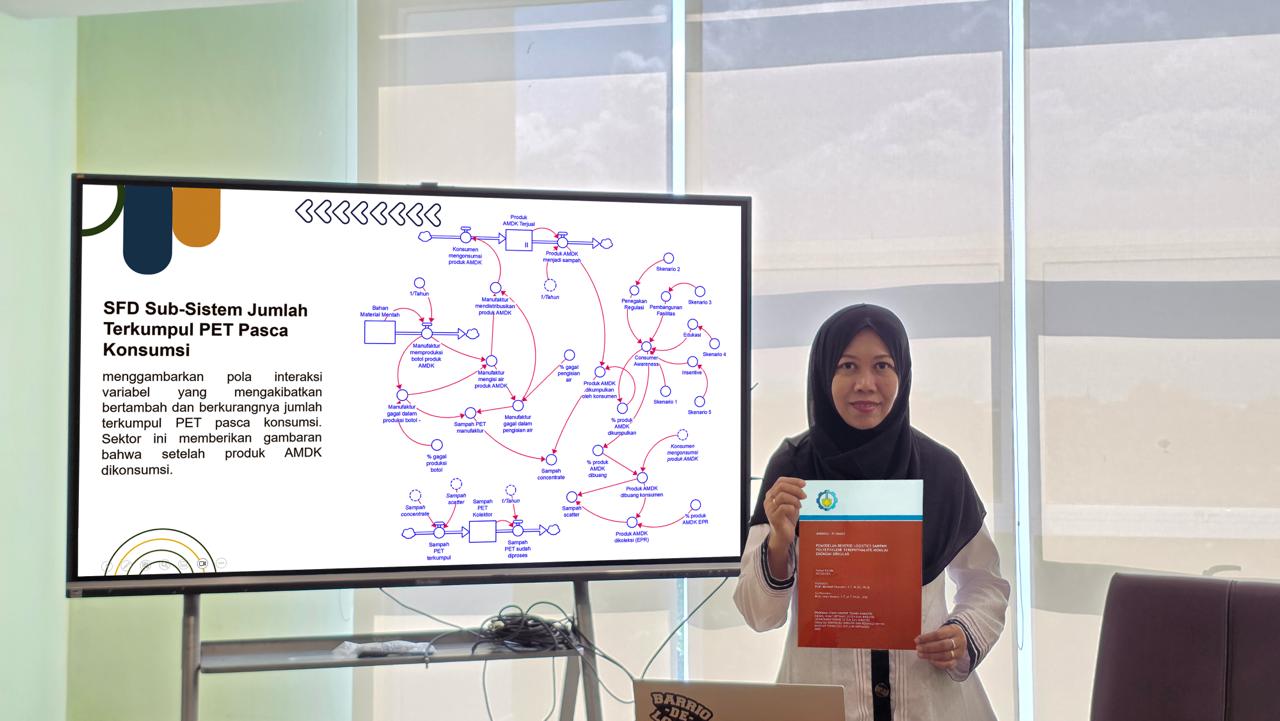ITS Graduates Create Reverse Logistics Model for PET Plastic Waste Recycling

Dr Yuniar Farida ST MT presenting her dissertation at the Doctoral Promotion Session at the Department of Systems and Industrial Engineering, ITS
ITS Campus, ITS News — Doctoral graduate from the Department of Industrial and Systems Engineering, Sepuluh Nopember Institute of Technology (ITS) Dr. Yuniar Farida ST MT designed a reverse logistics model for recycling Polyethylene Terephthalate (PET) plastic waste. This model, which applies the principle of a circular economy , can reduce Indonesia’s contribution as one of the world’s largest producers of PET waste.
In her dissertation, Yuniar revealed that Indonesia currently contributes to 3,200 tons of world plastic waste. This figure is due to the popularity of plastic as a raw material that can be produced into various products. “Especially PET plastic, the use of which continues to increase by 5.2 percent each year,” said Yuniar, who graduated as a doctor at the 131st ITS Graduation, Saturday (12/4).
Indonesia’s high contribution to producing PET plastic waste is dangerous, because it takes years to decompose plastic waste naturally. In the long term, high PET waste production can cause losses in environmental, health, and economic aspects.
This ITS Physics Engineering S1 alumnus further said that one solution to this problem is to apply the concept of a circular economy. Namely by emphasizing the reuse of resources to minimize waste and maximize value in each process chain. This concept is discussed in his dissertation entitled PET Waste Reverse Logistics Modeling Towards a Circular Economy.
In her dissertation, the lecturer who is an expert in operational research argued that the concept of a circular economy must be reviewed multidisciplinary by applying various tools. Yuniar then designed a PET reverse logistics model supporting a circular economy that is able to identify the best scenario or strategy in recycling PET plastic.

Dr Yuniar Farida ST MT showed her dissertation entitled PET Waste Reverse Logistics Modeling Towards a Circular Economy
To begin her research, Yuniar first conducted a consumer behavior analysis based on demographic elements, namely place of residence, education level, and income. This helped the woman born in 1979 to know the system components that needed to be in the reverse logistics model she would create.
In addition to its demographics, the ITS Industrial Engineering master’s graduate also analyzed consumer behavior Theory of Plan Behavior (TPB). This approach understands consumer behavior from the perspective of attitudes, subjective norms, perceived behavioral control, moral norms, and awareness of consequences. From the two analyses conducted, several behaviors were obtained that will be considered in designing model scenarios.
As a result, there are five scenarios designed by Yuniar. Including law enforcement that sets strict sanctions, provision of facilities that facilitate PET collection, education that increases public awareness, incentives in the form of compensation for recycling participants, and a combination of the four.
Of the five scenarios that have been created and tested using a reverse logistics model dynamic system simulation , Yuniar found that the law enforcement scenario and a combination of the four strategies with a three-fold increase from the existing are the best strategies that can be adopted in Indonesia. Both can provide a three-fold increase in benefits from the existing if not faced with budget constraints. “The implementation of both is able to achieve the zero waste target by 2050,” said the Mathematics lecturer at one of the state universities in Surabaya.
With this research, Yuniar hopes that the results of the concluded strategic recommendations can help the government in realizing zero waste and strengthening the implementation of a circular economy. In addition, Yuniar also hopes that this research can be useful for parties who are in contact with related sectors. (ITS PUBLIC RELATIONS)
Reporter: Ahmad Farhan Alghifari
Translator : Devinka Mutianeira
Related News
-
ITS Strengthens Sustainable Clean Energy Collaboration with Singapore
ITS Campus, ITS News — To further solidify strategic cooperation among global higher education institutions, a delegation from the
April 18, 2025 10:04 -
Supporting a Healthy Environment, ITS Inaugurates Centralized Hazardous Waste Management Facility
ITS Campus, ITS News — As a form of support for healthy environmental management, Institut Teknologi Sepuluh Nopember (ITS)
April 18, 2025 10:04 -
ITS Reaffirms Commitment to Gender Mainstreaming through Leadership School
ITS Campus, ITS News — To support inclusive and sustainable development by prioritizing justice and inclusiveness, Institut Teknologi Sepuluh
April 18, 2025 10:04 -
Providing Training, ITS Supports Hygienic and Safe Culinary Zones in Surabaya
ITS Campus, ITS News — Institut Teknologi Sepuluh Nopember (ITS) is fully supporting the strategic steps taken by the
April 18, 2025 10:04
